
The César E. Chávez building at the University of Arizona campus, which houses the Department of History, the Department of Mexican American Studies, and the Adalberto and Ana Guerrero Student Space in Tucson, on Friday, Oct. 10, 2025. The Guerrero Student Space, which was formed through student activism and has served many generations of Latine students, could face closure under the Trump administration’s proposed compact. (Alessandra De Zubeldia/CALÓ News)
Tucson, Arizona – The Trump administration’s “Compact for Academic Excellence in Higher Education” landed at the University of Arizona (UA) on Oct. 1, raising alarms among students and faculty who fear the agreement could strip away safe spaces, academic freedom and limit free speech and protest rights on campus.
Early this month, UA was added to a list of nine universities across the country that received the compact, which outlines sweeping federal expectations for universities seeking to maintain access to federal research funding, student aid and contracts. It emphasizes so-called “institutional neutrality,” bans the consideration of race or gender identity in admissions and hiring, requires universities to dismantle programs perceived as hostile to conservative ideas — including adhering to “defining and otherwise interpreting ‘male,’ ‘female,’ ‘woman,’ and ‘man’ according to reproductive function and biological processes” — and caps international student enrollment at 15 percent, with no more than five percent of the student body from a single foreign country.
The compact is part of a broader push by the Trump administration to reform higher education. On Jan. 21, Trump signed an executive order titled “Ending Illegal Discrimination and Restoring Merit-Based Opportunity”, which gutted federal diversity, equity, inclusion and accessibility programs.
Of the nine universities on the list, only the Massachusetts Institute of Technology has formally rejected the compact.
The Trump administration requested that UA provide written comments by Oct. 20 and a signed agreement by Nov. 21.
University spokesperson Mitch Zak told CALÓ News that, while no decision had been made, leadership, alongside the Arizona Board of Regents, was reviewing the compact “to fully understand its content, scope, legal ramifications, and potential implications. We are in communication with shared governance leaders and other universities that have received the compact.”
Meanwhile, its Faculty Senate voted against the compact on Monday in a 40-8 vote, and the Tucson City Council followed with its own unanimous opposition two days later.
In May, UA announced it would consolidate six of its seven cultural centers into one engagement center — a move many saw as an effort to comply with federal directives. In September, the Arizona Daily Star reported that the university had yet to issue explicit instructions on what to do if Immigration and Customs Enforcement (ICE) agents were to arrive on campus.
Against this backdrop, UA students say the compact feels like another step toward silencing marginalized voices.

A screen on the University of Arizona campus displays information about a Hispanic Heritage Celebration in Tucson on Friday, Oct. 10, 2025. Under the proposed compact, cultural events like this could be limited or prohibited. (Alessandra De Zubeldia/CALÓ News)
Cultural centers, community and safety on the line
For Arian Chavez, a 19-year-old sophomore and member of Students for Socialism, cultural centers offer more than just identity affirmation; they provide essential survival resources.
“These cultural resource centers provide fundamental resources for students, such as food, sometimes clothing, mental health counseling, and some resource centers provide free contraceptives, as well,” they said.
To Haziel Lopez, a 27-year-old UA employee and online psychology major, further dismantling spaces for marginalized communities feels like a massive regression.
“It’s taking something away that's already been established and that benefits the lives of other people, whether it be providing them a safe place, educating others on diverse heritages and embracing what makes us unique, providing scholarships for these people,” they said. “It's taking away something that's already existed and already created a community for other people.”
After reading the compact, Lopez said that “even existing as queer and Latino feels like a protest.”
The compact’s mandate to define “male” and “female” according to reproductive function would restrict access to bathrooms and sports based on sex assigned at birth.
According to Chavez, this directive “is once again a pretext for what the Trump administration has been trying to do… to constantly provoke their base in order to attack marginalized people,” and added that gender-neutral bathrooms are essential for students’ well-being. “These spaces are needed for folks to feel safe and to feel like they are a part of the U of A community.”
The compact could also erode safe spaces, Sanchez said, as it empowers immigration authorities by obligating the university to share all information about foreign students with federal departments.
“With so many international students and just people who are Brown on campus, we've already had professors and different admins say, ‘Make sure you have your papers on you because it's getting kind of crazy,’” he said.
Looking ahead, he fears a deeper entanglement between the university and federal agencies and awaits how UA President Suresh Garimella will react to the administration’s demands.

Old Main, the oldest building at the University of Arizona campus, in Tucson on Friday, Oct. 10, 2025. (Alessandra De Zubeldia/CALÓ News)
“It's a scary time, and I know that can be used loosely, but it's scary to even consider going to Pride. It's scary to go to school and, you know, dress a certain way or look a certain way or talk a certain way,” Lopez said.
‘If we can't protest, what are we supposed to do?’
The compact also requires universities to prohibit course materials tied to groups the U.S. government designates as terrorist organizations and limits activities that disrupt course instruction.
In light of the Trump administration designating Antifa as a terrorist organization on Sept. 22, for students like Anthony Sanchez, a 26-year-old senior double majoring in political science and economics, that part of the compact could mean erasing entire academic fields. Antifa, which stands for anti-fascism, is not an organized group but rather a political movement.
Sanchez, who identifies as Chicano, pointed to his own coursework as an example.
“I’m in a class right now called ‘Political Psychology of Xenophobia and how it manifests’. That wouldn't be allowed because it… talks about where xenophobia comes from and how conservative ideas perpetuate it.”
Last year, UA was recognized as one of the top 25 universities for protecting free speech by the Foundation for Individual Rights and Expression. If the compact is signed, Sanchez said he fears that the same professors who were granted academic freedom at the university before will be too afraid of retaliation if they teach certain subjects and that “a lot of classes won’t be taught.”
"This is not only affecting a certain subset of marginalized people, but this affects faculty members, workers at the university, and every department in the university as well,” Chavez added.
The compact doesn’t ban protests outright, but it sharply limits them. It prohibits demonstrations that “delay or disrupt class instruction,” block access to study spaces or create what it calls a “heckler’s veto” by shouting down speakers. The university would be required to impose swift sanctions and could even use “lawful force if necessary” to stop such actions.
For many students, especially those who are queer, Latine or immigrants, the vague language reads as a way to criminalize dissent and give campus police broad power to shut down organizing.
Sanchez posed the question: “If we can't protest, what are we supposed to do?”
Despite the uncertainty ahead, Lopez emphasized their resolve to remain strong as part of the Latine and queer communities.
“We're not going away. No matter what bill you post, no matter what changes or what happens in a college, these people will still exist,” they said.
For Chavez, the path forward is clear.
“We are going to continue to fight no matter what,” they said. “Arizona is my home. Southern Arizona is my home. I'm going to continue being a student here as long as I can and keep putting in the work to organize on campus and fight the good fight.”
Alessandra De Zubeldia is a previous James B. Steele fellow in investigative business journalism who recently earned a master’s degree in investigative journalism from ASU’s Walter Cronkite School of Journalism. She grew up in Guadalajara, Mexico, and has lived in Arizona for over a decade, where she centers her reporting on the voices and experiences of marginalized communities.

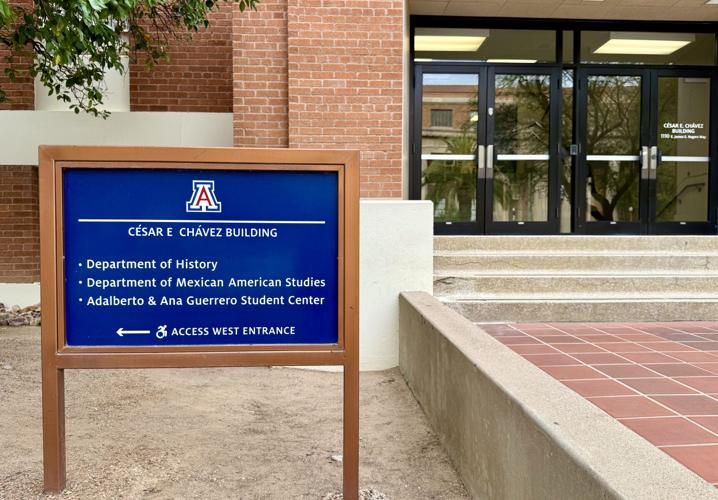

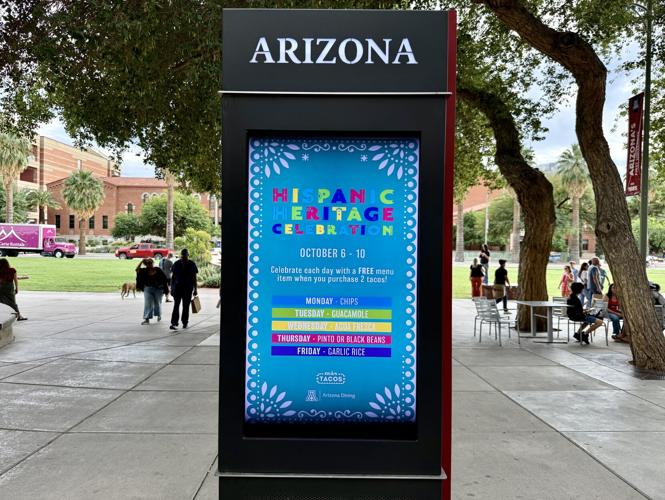
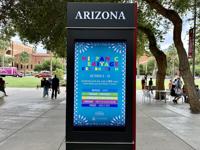
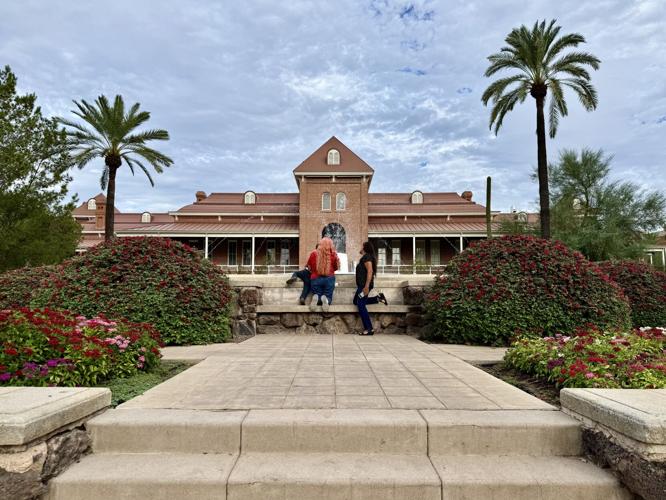










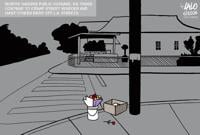
(0) comments
Welcome to the discussion.
Log In
Keep it Clean. Please avoid obscene, vulgar, lewd, racist or sexually-oriented language.
PLEASE TURN OFF YOUR CAPS LOCK.
Don't Threaten. Threats of harming another person will not be tolerated.
Be Truthful. Don't knowingly lie about anyone or anything.
Be Nice. No racism, sexism or any sort of -ism that is degrading to another person.
Be Proactive. Use the 'Report' link on each comment to let us know of abusive posts.
Share with Us. We'd love to hear eyewitness accounts, the history behind an article.